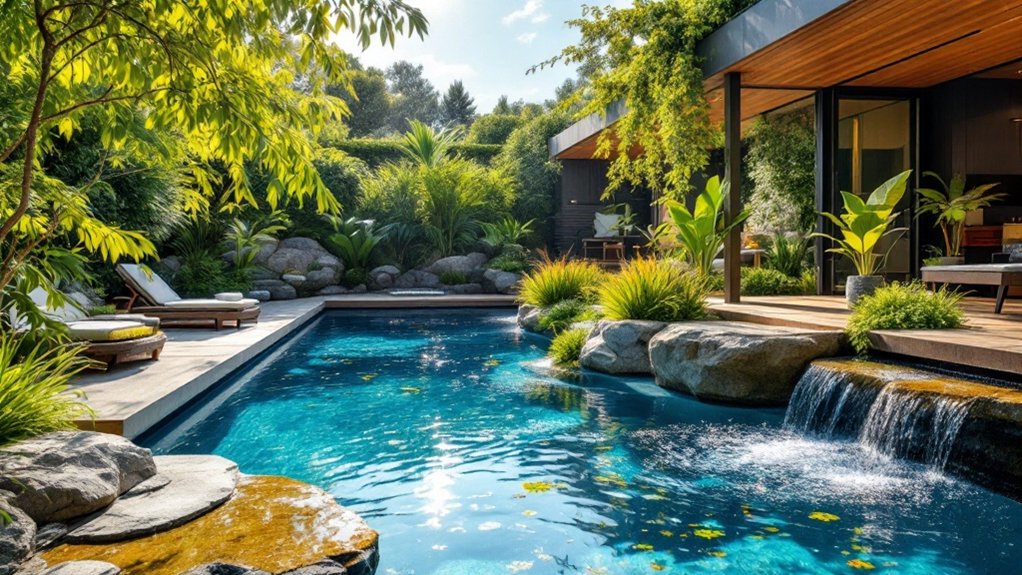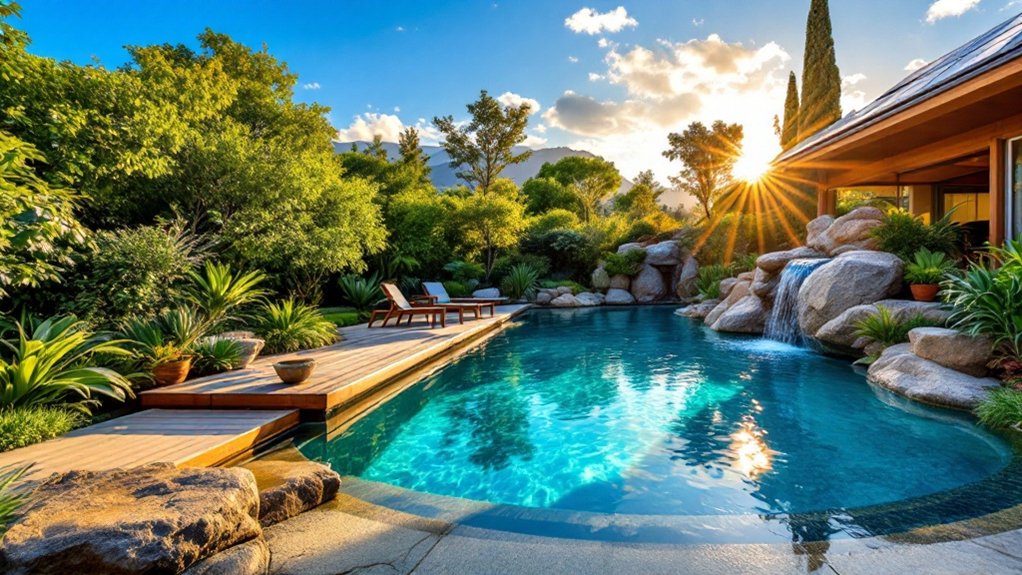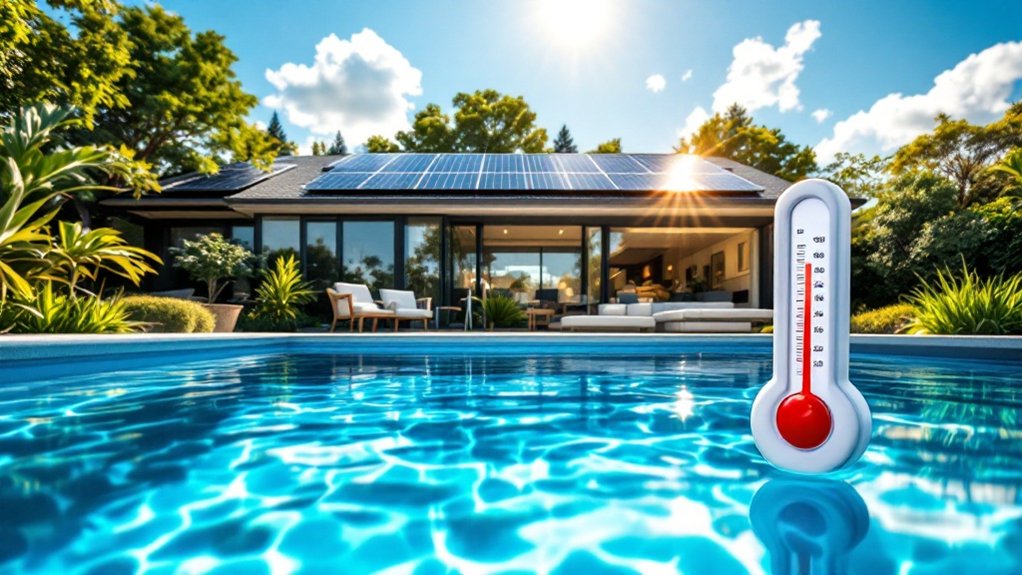The growing interest in sustainable living has led many to explore low-impact pool options. These alternatives not only reduce environmental harm but also enhance the swimming experience. From natural swimming ponds to energy-efficient systems, the choices are diverse. With a focus on minimizing chemical usage and promoting biodiversity, these pools offer practical benefits. The question remains: which option aligns best with both personal preferences and eco-friendly values?
Understanding Eco-Friendly Pools
As homeowners increasingly prioritize sustainability, understanding eco-friendly pools becomes essential for those seeking a balance between leisure and environmental responsibility. Eco-friendly pools utilize sustainable materials and energy-efficient technologies to minimize their ecological footprint. Key features often include natural filtration systems, which reduce the need for harsh chemicals, and solar heating options that harness renewable energy. These pools can also incorporate energy-efficient pumps and LED lighting to further decrease energy consumption. Additionally, many eco-friendly pools are designed to blend harmoniously with the surrounding landscape, using native plants and stones to create a natural aesthetic. By adopting these innovative approaches, homeowners can enjoy the benefits of a swimming pool while contributing to a healthier planet, making eco-friendly options an attractive choice for environmentally conscious individuals. Regular pipe cleaning can also enhance the overall efficiency of these systems, ensuring improved equipment efficiency and prolonging the lifespan of pool components.
Natural Swimming Ponds
Natural swimming ponds offer an eco-friendly alternative to traditional pools, promoting biodiversity and a chemical-free swimming experience. However, potential owners must consider the maintenance requirements, as these ponds require careful management of plant life and water quality. Understanding both the benefits and maintenance aspects is essential for anyone interested in this sustainable option.
Benefits of Natural Pools
Although traditional swimming pools offer a controlled environment, natural pools provide a unique blend of ecological benefits and aesthetic appeal. These systems create a harmonious space where aquatic plants and microorganisms work together to purify the water, eliminating the need for chemical treatments. This natural filtration promotes biodiversity, attracting various wildlife species and enhancing the overall ecosystem. Additionally, natural pools often feature organic shapes and surrounding landscapes that seamlessly integrate with the environment, offering a serene and picturesque setting. The absence of harsh chemicals makes these pools gentler on the skin and eyes, promoting a healthier swimming experience. Ultimately, natural pools represent a sustainable choice that fosters environmental stewardship while providing a tranquil retreat for relaxation and recreation.
Maintenance Considerations for Ponds
Maintaining a natural swimming pond requires a thoughtful approach to secure its ecological balance and aesthetic appeal. Regular monitoring of water quality is essential, focusing on parameters such as pH, ammonia, and nitrate levels. Introducing beneficial plants aids in filtration and algae control, while periodic pruning guarantees that overgrowth does not disrupt the ecosystem. Seasonal maintenance tasks include removing debris, maintaining the natural filtration system, and ensuring adequate sunlight reaches submerged plants. Wildlife should be considered; creating habitats for beneficial organisms helps sustain ecological health. Additionally, maintaining proper circulation through pumps or aeration systems can enhance water clarity. Overall, commitment to these maintenance practices will secure a thriving and beautiful natural swimming pond for enjoyment.
Solar-Heated Pools
Solar-heated pools offer significant energy efficiency benefits, making them an attractive option for environmentally conscious pool owners. When considering installation, factors such as local climate, pool size, and available space for solar panels must be taken into account. These elements play a vital role in maximizing the effectiveness and sustainability of solar heating systems.
Energy Efficiency Benefits
When considering energy efficiency in pool options, solar-heated pools stand out as an environmentally friendly choice. Utilizing the sun’s energy, these pools considerably reduce reliance on fossil fuels, leading to lower greenhouse gas emissions. They harness solar panels to convert sunlight into heat, providing a cost-effective solution for maintaining water temperature. As a result, homeowners can expect reduced energy bills compared to traditional heating systems. Additionally, solar-heated pools can extend the swimming season, allowing for more enjoyment without the added energy costs. The minimal environmental impact further enhances their appeal, aligning with sustainable living practices. Overall, solar-heated pools represent a forward-thinking approach to pool ownership, emphasizing efficiency and eco-friendliness.
Installation Considerations
The installation of solar-heated pools requires careful planning to optimize performance and efficiency. Key considerations include the orientation and angle of solar panels, which should be positioned to maximize sunlight exposure throughout the day. The site’s geographical location and climate also influence the system’s design, necessitating an assessment of local weather patterns. Proper sizing of solar collectors is essential, as it directly affects heating capacity and energy output. Additionally, plumbing and electrical connections must be installed correctly to guarantee functionality and safety. Homeowners should also consider potential shading from trees or buildings, which could diminish efficiency. Engaging professionals with experience in solar technology can facilitate a smoother installation process and enhance long-term effectiveness.
Saltwater Pools
An increasing number of homeowners are turning to saltwater pools as a low-impact alternative to traditional chlorine pools. These pools utilize a saltwater chlorination system that generates chlorine from salt, resulting in softer water that is gentler on the skin and eyes. This method reduces the need for harsh chemical additives, making maintenance simpler and more eco-friendly. Additionally, saltwater pools often have lower operating costs over time, as the chlorine generation process minimizes chemical purchases. Homeowners appreciate the reduced odor and irritation associated with chlorine pools, enhancing their swimming experience. As awareness of health and environmental impacts grows, saltwater pools are becoming a popular choice among those seeking a more sustainable and enjoyable swimming option.
Above-Ground Pool Options
Homeowners seeking low-impact pool options often explore above-ground pools as a versatile and cost-effective alternative. These pools come in various sizes, shapes, and materials, making them adaptable to different yards and budgets. Easy to install and remove, above-ground pools can provide seasonal enjoyment without the permanence of in-ground installations. They typically require less maintenance and lower upfront costs, making them appealing for those concerned about environmental impact. Additionally, many above-ground pools feature energy-efficient filtration systems, further enhancing their eco-friendliness. With various accessories available, such as ladders and safety barriers, above-ground pools can be customized to meet diverse family needs. This option allows homeowners to enjoy the benefits of a pool while minimizing their ecological footprint.
Pool Covers and Energy Efficiency
Numerous pool owners are increasingly recognizing the importance of pool covers in enhancing energy efficiency. Pool covers serve multiple functions, primarily reducing heat loss and minimizing evaporation. By retaining heat that would otherwise escape, these covers considerably decrease the energy required for heating water, leading to lower utility bills. Additionally, they help maintain water temperature, thereby ensuring a comfortable swimming experience while reducing the need for constant heating. In addition, pool covers can limit debris accumulation, decreasing the frequency of cleaning and chemical use. This not only conserves water but also contributes to a more sustainable pool environment. Overall, incorporating a pool cover is a practical step toward energy efficiency, promoting both cost savings and environmental responsibility for pool owners. Furthermore, regular pool maintenance is essential to ensure the longevity and effectiveness of your pool cover.
Maintenance Tips for Sustainable Pools
Maintaining a sustainable pool goes beyond just using effective covers; it involves a holistic approach to pool care that prioritizes environmental responsibility. Regular water testing is essential to guarantee chemical levels are balanced, preventing excessive usage of harmful substances. Utilizing saltwater systems can reduce the reliance on traditional chlorine, minimizing chemical impact. Eco-friendly cleaning methods, such as using a vacuum with minimal energy consumption or natural enzymes, contribute to sustainability. Additionally, routine maintenance of equipment guarantees peak energy efficiency, reducing electricity waste. Implementing rainwater harvesting for topping up pool water not only conserves resources but also minimizes dependency on municipal water supplies. Adopting these practices fosters a healthier ecosystem while enhancing the overall sustainability of pool ownership. Furthermore, regular inspections of equipment can help identify potential issues before they become major, ensuring efficient operation and prolonging the life of your pool systems.
Frequently Asked Questions
What Are the Costs Associated With Low-Impact Pool Options?
The costs associated with low-impact pool options vary considerably, encompassing installation, maintenance, and operational expenses. Factors influencing costs include pool size, materials used, and additional features like heating, lighting, and safety equipment.
How Do I Choose the Right Pool Size for My Yard?
Choosing the right pool size involves evaluating the yard’s dimensions, considering the intended use, and ensuring adequate space for landscaping and safety. A proportional design enhances aesthetics while maintaining functionality and comfort for users.
Can I Install a Low-Impact Pool Myself?
Installing a low-impact pool independently is feasible for those with adequate skills and knowledge. However, careful planning, adherence to local regulations, and consideration of safety measures are essential to guarantee a successful installation process.
What Permits Are Needed for Low-Impact Pool Installation?
When installing a low-impact pool, obtaining necessary permits is vital. Typically, homeowners must secure building permits, electrical permits, and possibly zoning approvals. Regulations can vary greatly by location, so checking with local authorities is essential.
Are There Any Health Benefits to Low-Impact Pools?
The health benefits of low-impact pools include improved cardiovascular fitness, enhanced joint flexibility, and reduced stress on the body. These pools provide a safe environment for individuals seeking effective exercise without the strain of high-impact activities.
Conclusion
In summary, embracing low-impact pool options offers a sustainable path to leisure while minimizing environmental harm. From natural swimming ponds that enhance biodiversity to energy-efficient solar-heated and saltwater systems, pool owners can enjoy a revitalizing experience that aligns with eco-friendly practices. Furthermore, above-ground pools present versatile and budget-conscious alternatives. By prioritizing these options and implementing proper maintenance, individuals can create a healthier swimming environment that supports both personal enjoyment and the planet’s well-being.




